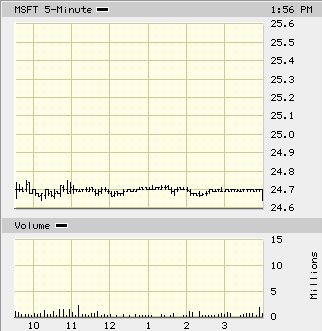What if you held an auction, and no one came?
- Microsoft buys back $3.8B of shares, shifts remainder
- Microsoft Boosts Buyback Plan
- Microsoft Changes Tactic in $40B Buyback
First, a mea culpa. I speculated previously that MSFT would have done their homework to ensure that the requisite number of shares could be secured - rather than look foolish. Apparently, I was wrong. As such, I further anticipated that the stock would drop on completion of the tender - but it's gone up now that the tender failed. The theory, supposedly, is that MSFT will be forced to buy the remaining shares on the open market (and quickly) in order to still make their revised EPS guidance for the year. I guess that's possible, although I really don't think MSFT would have any qualms about simply ratcheting guidance back down in the wake of the failed tender. BTW, for market manipulation theorists, take a look at yesterday's intraday action:
I guess that was just a coincidence? :-) Needless to say, the MSFT market maker in New York will be getting his bonus this month - and of course a few recently-ex MSFT shareholders won't be feeling too happy about their choice.
So what now? Personally, I see the Dutch auction as having been a manipulation plain and simple. Long-term best interests of shareholders would have been served by MSFT acquiring the most shares at the lowest price. That was already a suspect result of the auction (see my previous post on that topic), and clearly won't happen now that it has failed to secure the desired shares and the stock has been bumped still higher as a result. So the auction seems to have served no particular purpose other than to goose the stock price short-term - and management denies even being focused on the stock versus trying to manipulate it day to day. Um...right. Don't get me wrong, as stated, if the choice is between hoarding excessive levels of cash versus buying back shares, I'm all for share buybacks. I'd simply prefer that those buybacks be about reducing shares outstanding and not manipulating short-term prices. Briefing.com, who I generally respect, sees it differently:
When Microsoft made the Dutch Auction announcement, its stock was at $22.85. The fact that only 155 million shares were tendered, when Microsoft was willing to pay between $22.50 and $24.75 per share, stands out really as a vote of confidence that investors believe greater upside lies ahead for the stock. Additionally, the Board's willingness to commit the $16.2 billion to the traditional repurchase program sends a strong signal that it sees plenty of value in the stock as well.
Critics no doubt will decry the buyback news as being a sign of Microsoft's poor growth prospects. It makes sense, though, for Microsoft to do this because (a) any large acquisition it might consider will bring down antitrust heat and (b) it has the capability to do it with its tremendous cash flow. Rather than leaving shareholders' cash in the bank, Microsoft is doing the right thing in returning it to them with the buyback, not to mention through increased dividend payments.
I agree that the tender result suggests that most shareholders see greater upside than $24.75 (Duh!), though I'm not sure I'd call that a "vote of confidence" per se - it's more like a refusal to capitulate. I'm also not sure that the buyback says much about the Board's assessment of value. They might believe that there's "plenty of value", or they may simply recognize that given the stock's miserable performance and ongoing massive dilution via insider compensation, they can either keep hoarding excessive cash, further dilute the stock, and risk getting thrown out by shareholders (along with the management team), or do buybacks. And of course there were alternatives to the Dutch auction including increasing the regular buyback - like say when the stock was back in the low $20's. Bottom line, to the extent that the buybacks are real, immediate and/or front-end loaded, I'm prepared to accept that the Board and management might see value. But buybacks on extended timelines that get totally erased by ongoing dilution (like most of the $50B+ over the past 5 years), or failed auction stunts, don't say much at all - well, that's positive at least. Oh, and some insider buying - versus leading the entire market in insider selling - might also demonstrate that the "we see tremendous value" party line is more than simply lip-service.


1 Comments:
How about the odd timing between "goosing the stock price" at this time of year and the SPSA payout here coming up.
I can tell you one thing...I'll be happy to see MANY of the people that I have heard about leaving post-September 15th go bye bye.
By Anonymous, at 8:42 PM
Anonymous, at 8:42 PM
Post a Comment
<< Home